It has been a pleasure here at qosfc.com to hear from Mike Bennett whose father we have previously featured, Reuben Bennett. With Mike now adding additional input we are able to provide an updated version of this article on Reuben Bennett`s career. With the immense imprint Reuben Bennett made on European club football, the original version of this article was published to coincide with the 2010 Champions League Final. We are publishing this updated version to coincide with the league opening game this weekend against another of Bennett`s ex clubs, Dundee.
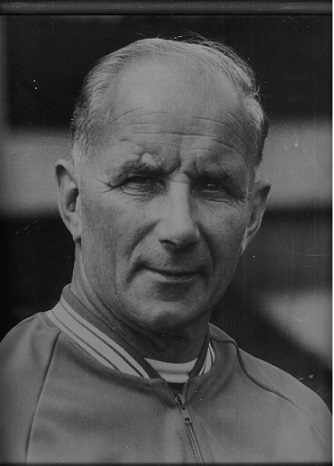
“He was born in Aberdeen on 21st December 1913. He was touring with an Aberdeenshire Select XI in Yorkshire and was spotted and then signed by Hull City. Dad joined Hull for the 1935/36 season. I do not know how many games he played for the first team, but the existing goalkeeper, Maddison, was a bit of a local legend. Dad`s first team games were consequently restricted.”
Geordie Maddison was indeed a Hull City legend with 456 first team appearances between 1924 and 1938.
“I have no date when Dad left. I presume it was at the end of this season, but because of his injury it may have been earlier. Regarding his injury it was to his knee and as a result Hull City terminated Dad`s contract.”
“Dad joined Queen of the South in the 1936/37 season. At the time he had offers from other clubs. It was Mother who told me about Dad having a choice of teams to select from, but I have nothing regarding the offers or details. This was over 70 years ago and the difference between one offer and another might have only been a few shillings a week, which in today`s terms is laughable. But that was how it was in the `30s. However I think his time at Palmerston was partly on a trial basis.”
“Remember he had left Hull City because of an injury which in those days should have finished his career, and he had been out of the game living back home in Aberdeen whilst recovering. So when, as I understand it, he was playing for Queens and broke his collar bone his opportunity to continue playing for the Queens was lost. As you know his was not a long time there, because the hoodoo of injury, a constant problem with Dad, struck again, which meant he was finished at Queens. With regard to his injury, this was something that my Mother told me and I never questioned it. So I can be of no greater help in this matter.”
Bennett joined The Doonhamers` playing staff under George McLachlan in the Autumn after the QoS tour to Europe and North Africa. Bennett’s first team debut for Queens was on Saturday 14th November 1936 in a 2-1 defeat away to Clyde. Bennett played in the home 1-0 win against Kilmarnock the week after and his third and final game for the first team was the week after again – Hearts handed Queens a 4-0 gubbing at Palmerston. Bennett also played half a dozen reserve games for QoS in the month that he spent at Palmerston Park. Beyond this the details surrounding Bennett’s arrival and time with The Doonhamers is otherwise unclear. What is known is that Bennett’s time at Palmerston was when the enormously experienced Willie Fotheringham was still there. It was Fotheringham who played in goals in January 1937 when Queens knocked Rangers out of the Scottish Cup by a goal to nil, only weeks after Bennett’s departure. 1937 was the year Fotheringham retired from playing.
“He then went down to London and played some works football (just as well paid in those days), until the outbreak of the War. Dad was a Staff Sergeant Instructor with the Gordon Highlanders during the war, and it was this activity that enabled him to regain full fitness, and represent the Army Physical Training Corp in Paris. He was amongst the first signings that George Anderson (who part owned Dundee) made before the end of the War.”
The post war years saw something of a renaissance for Dundee. The 1945/46 season was unofficial. Dundee though won the Scottish Southern League `B` Division. For good measure, on the resumption of official league structures the season after Dundee were the Scottish `B` Division champions. This time the divisional title win took them to the top tier.
“I have in front of me Dad`s contract for season 1946/47. His deal was £5 per week in the closed season, and £7 a week in the playing season. Not much compared to Wayne Rooney, but it was still well above the average working man`s wage, and that is exactly what footballers were in those days - working men, not superstars, nor celebrities, just ordinary folk with a special talent that their peers admired and respected and for which they would pay their hard-earned money to watch.”
“As far as the number of games that he played for Dundee, I have been given his statistics by the club historian. In all he played 94 games which would have been even more had he not suffered the injuries he did. The above does not include any reserve matches he might have played.”
Any league games anyone played in the unofficial 1945/46 season have not been regarded as counting to players official league appearances tally.
“In amongst the disarray of my filing lies what I think is my Dad`s last contract with Dundee, with the fitness clause inserted. It is said that his fearlessness cost him these injuries, and he often felt that they robbed him of the International cap that he yearned for. In the end the knee injury sustained at Hull City finally caught up with him.”

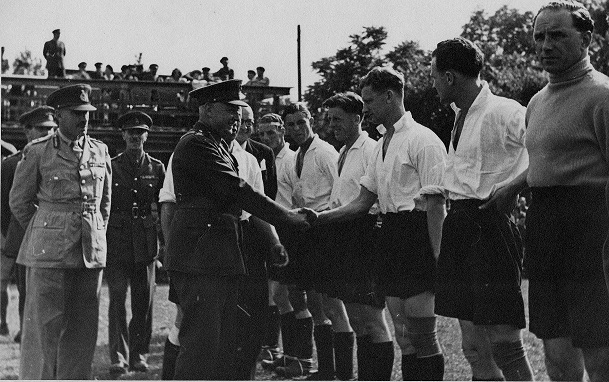
(In 1946 Dundee played six games on a tour of Germany, Austria and Italy against forces teams. Two places to Bennett`s right and shaking hands with the officer is Bobby Ancell. Two places further right than Ancell is future 20 cap full internationalist, Doug Cowie).
Someone Bennett played beside at Dundee was to play an important part later in his career – Dumfries born ex Scotland and Newcastle United left back, Bobby Ancell. Bennett then played very briefly for Elgin City before returning to Dundee this time in a coaching capacity. Dundee were a force to be reckoned with. Although Bennett was on the fringes for his 1948/49 last season at Dens as a player, his team mates ran up in the league only finishing a point behind Rangers. The Dee were a point clear on the morning of the last day of the season. Their 4-1 disaster at Falkirk though allowed Rangers to plunder the title in beating Albion Rovers by the same score as Dundee`s defeat. Then on 21st September 1950, the ambitious Anderson beamed to an astonished press conference, "Gentlemen, I want to introduce you to Billy Steel, ex-Derby County and now of Dundee." Steel had broken the British transfer fee when he joined Derby for £15,500. Dundee astounded the country when breaking the Scottish transfer fee record with Steel`s signature for £23,500 (the world record fee at the time was the £24,000 Derby had already paid for Johnny Morris).
“The `Management` team then consisted of George Anderson (Manager), with Reggie Smith and Reuben Bennett as the coaching team. Between then and 1953 (when Dad left Dundee), Dundee won back-to-back League Cups, and were Scottish Cup runners-up.”
After his impressive contribution at Dundee, Bennett was appointed Manager at Ayr United in May 1953. The highlights were winning the club`s League Cup groups to make it to the quarter finals twice. In the first of those quarter finals Rangers were beaten 3-2 in one leg as Ayr went out 6-5 on aggregate. League results though were inconsistent. April 9th 1955 was the date of the third of four straight Ayr wins. It is also the day Bennett resigned.
“He resigned because he had had enough of Directors interfering in what he was trying to achieve at the club. The job at Ayr United meant that he was required to carry out many administrative duties, often some that a club secretary would perform. This side of the job he detested - he was coach, not an office manager. His experiences at Ayr United soured him so that, despite offers, he never wanted to take another managerial role again. Dad was out of the first-class game for some months. However he joined up with Bobby Ancell, former colleague at Dundee (and who gave me my first watch) at Motherwell. He was the assistant trainer there, but in fact was the one who took the training sessions on Tuesday and Thursday nights (players were part-time at Motherwell then).”
Ancell was Manager at Motherwell and familiar with Bennett`s coaching talents from Bennett`s second stint at Dundee. In the first half of their second season together things were really happening at Fir Park for Ancell and Bennett. `Well had spent most of the season in second place and had led the league for a couple of weeks. From such attention catching form an offer was made to take Bennett elsewhere.
“In December 1956 Third Lanark approached him to become coach (then called trainer) and we moved to Glasgow. Not long after, the Manager, Bill Hiddleston was `removed`. [Hiddlestone would later return in a different capacity and become a name of infamy in the demise of Third Lanark as a football club]. The task of securing promotion ended up with Dad. It was at Thirds that his abilities as a coach really came to the fore, and he was reported as being on a salary that most Managers would like. When we moved to Glasgow we were in one of Hiddleston`s flats. After Hiddleston was `removed` it was not long before we moved from Cathcart over to Queens Park to a flat that had nothing to do with Hiddleston."
Thirds were in the second tier of Scottish football when Bennett arrived. This was short lived though. An excellent late season run of 13 wins from 17 games carried them to the promotion that accompanied a runners-up spot.
"Having won promotion, although he had a core of talented players (e.g. Joe McInnes, Johnny Kelly, Jocky Robertson), he knew that he did not have a team strong enough (let alone a squad), that would do well in the top tier. All that summer Dad ran trials at Cathkin Park, inviting players to try for a position at Third Lanark. In the end he put together his team etc. and started into the new season. I cannot say exactly at what point Bob Shankly came, but Mother told me that the worst time for Dad was prior to the opening of the 1957/58 season when he showed nerves for the one and only time in his career, and was sick the night before the first match. Whether it was the night before the start of the League Cup campaign or the League itself I have no idea. I suspect it would have been before the first game in August."
If Bennett`s attack of nerves were before the start of the six game, League Cup group campaign in August, his concerns were unfounded. Like the two League Cup campaigns for which he was in charge at Ayr, Bennett`s team won the group. They then had a rude awakening in September losing their first three league games.
Mike Bennett again. "The turnaround in the League came with the Kilmarnock match". Indeed from this fourth game in the league, they got a grip. Only Hearts and Celtic took points from them in a run of only one defeat in the next eight games to steady the ship into mid table safety. We have tried to ascertain when it was Bob Shankly arrived at Thirds. A Third Lanark historian has been able to advise us, `around September 1957`, but we have been unable to obtain more precise info than this. From the 15 - 16 months or so that Reuben Bennett and Bob Shankly worked together at Thirds, this would later play an important part at a junction point at Bennett`s next club. It was at his next club where Bennett was to make his greatest mark on football.
“In 1958 he was approached by Liverpool to come South and in December (a fateful month for Dad it seems), he joined them. Liverpool, although then a Second Division club, were a big club with as good a history as the best [clubs] in England. He was a coach in demand, and when he went to Liverpool it was as Chief Coach, not just as a member of the coaching staff.”
He joined Liverpool’s coaching staff during the reign of Manager Phil Taylor. Phil Taylor was not the power to take Liverpool back to the top flight. A year after Bennett’s arrival Taylor resigned on 17th November 1959.
“So highly was he thought of at Liverpool that he was offered the Manager`s job ahead of Mr Shankly, but declined it. That was probably one of his greatest decisions because history shows how important that was."
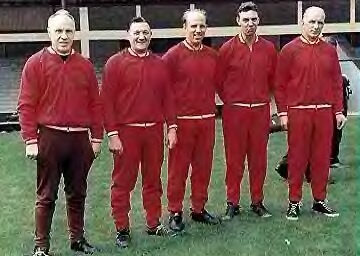 ”
”
(Bill Shankly, Bob Paisley, Ronnie Moran, Joe Fagan and Reuben Bennett)
In December Taylor`s replacement was announced as Bill Shankly. The first Liverpool Manager to have complete charge of matters of team selection, he immediately set about rejuvenating the club with relish. Shankly arrived at a decayed club in stagnation later saying of Anfield, “The place was a slum. Parts of the ground were dilapidated and crumbling.” Shankly recognised the strength of the existing coaching staff of Bennett, Bob Paisley and Joe Fagan. Shankly elected to retain all three. He was already aware of Bennett from his footballing brothers in Scotland, specifically Bob Shankly from Bennett`s days at Thirds. This though was small beer as ‘personality-wise’, Bennett and Shankly simply hit it off.
The four coaches started holding their coaches meetings in the Anfield boot room. In this informal environment, between them they discussed tactics and plans. Thus the management philosophy behind Liverpool`s massive success over the next three decades was born.
“Dad was Chief Coach. He was never the Trainer at Liverpool - that was Bob Paisley. Dad was Shankly`s constant companion in these early years travelling with him to watch matches and players. They were like two peas in a pod, sharing the same love of the game, the same devotion to it, spending long hours travelling together with the many conversations and discussions this would entail. In fact the first two critical signings made by Shankly were Ian St. John, who had been under Dad`s tutelage at Motherwell, and Ronnie Yeats, whose family in Aberdeen were known to Dad - I even knew Ronnie`s wife Maggie when I was a wee boy.”
The club embarked upon the clear out of clear outs releasing 24 players. Notably though they retained Roger Hunt and Gerry Byrne. After the season’s end in 1961 Liverpool signed St John and Dundee United`s Yeats. Yeats was promptly installed as captain with the giant Centre Back going on to become known as `The Colossus`.
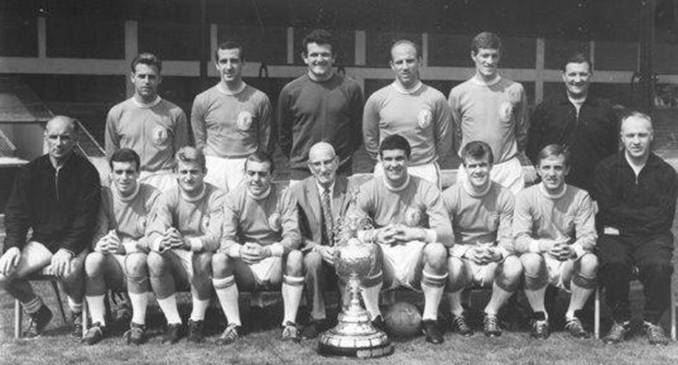
(Liverpool 1964/65 with the championship trophy from the season before)
Liverpool were emphatic winners of the Second Division title (then the second tier of English domestic football) in 1962 by eight points in the era of two points for a win. In the top division they were champions in 1964 and 1966. The 1965 FA Cup Final was 0-0 after 90 mins. An extra time goal by by each of Hunt and St John, a dynamic and prolific forward pairing, outscored the solitary Leeds goal by Billy Bremner.
Liverpool reached the European Cup semi final in 1965, losing to Inter Milan. Then at Hampden Park in Bennett`s native Scotland, Liverpool were European Cup Winners’ Cup finalists in 1966, losing to Borussia Dortmund after extra time.
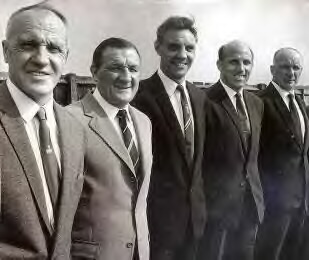
(Shankly, Paisley, Fagan, Moran and Bennett)
With Ronnie Moran added to the coaching staff, Bennett in 1971 changed his role.
“He then went on to `special duties`. When he undertook his special duties role with Liverpool it meant that he travelled around visiting many football clubs as part of his dossier-building function.”
St John later recalled of Bennett being sent on trips to Europe for up to a week at a time to spy on opponents. Bennett and his fellow boot roomers steered Liverpool to become English champions again in 1973. This marked the green shoots of a gluttonous domestic trophy haul that lasted until 1990 as the team to beat in England. Liverpool returned to a European final again, the UEFA cup final in 1973. The opponents were Borussia Mönchengladbach captained by Berti Vogts and featuring Rainer Bonhof and Jupp Heynckes. Played over two legs, Euro agent Bennett had the satisfaction of his side running out 3-2 aggregate winners.
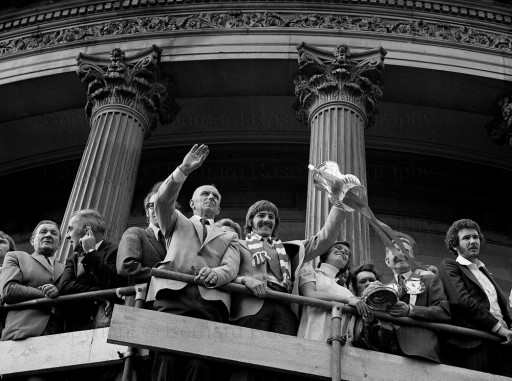
(Steve Heighway is holding the FA Cup following the win in 1974. Bennett is immediately to his side waving to the crowd)
Bennett was retained by new manager Bob Paisley after Shankly resigned following the 1974 FA Cup final win. Another English Championship and UEFA Cup double was gathered in 1976 (Club Brugge were defeated 4-3 in the two leg UEFA Cup Final). Then, Mönchengladbach were again the final opponents this time in the 1977 European Cup. Vogts, Bonhof and Heynckes were both out of luck once more. Bonhof hit the post with the game at 0-0. At 2-1 down Vogts conceded a penalty for a challenge on Kevin Keegan. Phil Neal slotted it away to tie up the game.
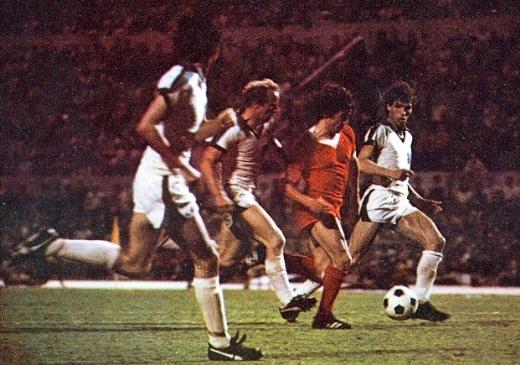
(The 1977 European Cup Final. A moment later Keegan was on the deck from Vogts` challenge)
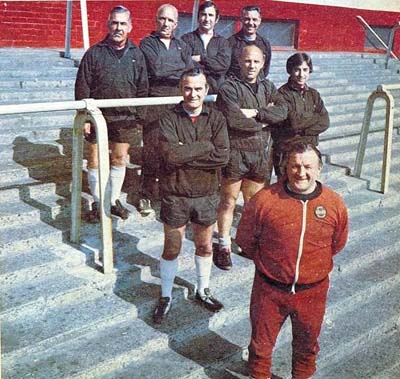
(In this snap of Bob Paisley and his back room staff, Bennett is second left in the back row).
Excluding a procession of domestic silverware successes, this gives Bennett a trophy count in the European Cup alone of four wins (1977 as mentioned above, Kenny Dalglish scoring the only goal against Club Brugge in `78, Alan Kennedy doing the same against Real Madrid in `81, and `84 was the final of the Bruce Grobbelaar ‘spaghetti legs’ penalty shoot out against Roma). Added to this is one runners up place (the 1985 final defeat by Juventus overshadowed by the off pitch events in the Heysel Tragedy). Liverpool won two UEFA Cups in Bennett’s time at Anfield and one UEFA Super Cup beating Kevin Keegan’s Hamburg 7-1 thanks to a 6-0 second leg apocalypse at Anfield. The trophy to elude Bennett was the European Cup Winners’ Cup with the nearest to success being the extra time defeat in 1966 at Hampden.
“He finally quit the game. This was after the 1985-86 Cup Final [A 3-1 win against Everton]. It was Dad`s decision to quit the game at the age of 72 - there was no pressure from the Club. He died on 14th December 1989 - one week short of his 76th birthday. At his funeral, the church was so crowded that the only place for the representatives of Everton (the Manager and coaching staff) to sit was with us on the family pew. He is buried within sight of both Anfield and Goodison.”
Bennett is the only member of the original Anfield boot room quartet who did not manage Liverpool at some point during his career. Thus the former keeper’s contribution and achievements remain relatively untrumpeted.
“My Father was a tough but modest man in many ways, although he had very strong opinions and ideas. Because Dad was the type to work in the background and bask in the reflected glory he never wanted nor had to present himself publicly in the same way as other members of the Boot Room had to.”